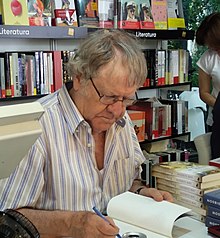
Back ايان جيبسون ARZ Ian Gibson Catalan Ian Gibson Czech Ian Gibson Esperanto Ian Gibson Spanish Ian Gibson Basque Ian Gibson (auteur) French Ian Gibson Irish Ian Gibson Galician Ian Gibson Italian
This article includes a list of general references, but it lacks sufficient corresponding inline citations. (September 2018) |
Ian Gibson | |
|---|---|
 Ian Gibson at the Madrid Book Fair on 2 June 2019 | |
| Born | 21 April 1939 Dublin, Ireland |
| Occupation | Writer |
| Language | Spanish English |
| Nationality | Irish |
| Citizenship | Spanish |
| Alma mater | Trinity College |
Ian Gibson (born 21 April 1939) is an Irish author and Hispanist known for his biographies of the poet Antonio Machado, the artist Salvador Dalí, the bibliographer Henry Spencer Ashbee, the filmmaker Luis Buñuel. and particularly his work on the poet and playwright Federico García Lorca, for which he won several awards, including the 1989 James Tait Black Memorial Prize for biography. His work, La represión nacionalista de Granada en 1936 y la muerte de Federico García Lorca (The Nationalist Repression of Granada in 1936 and the Death of Federico García Lorca) was banned in Spain under Franco.
Born in Dublin to a Methodist family, he was educated at Newtown School in Waterford and graduated from Trinity College, Dublin. He taught modern Spanish literature at Queen's University Belfast and the University of London before moving to Spain. His first novel, Viento del Sur (Wind of the South, 2001), written in Spanish, examines class, religion, family life, and public schools in British society through the fictitious autobiography of a character named John Hill, an English linguist and academic. It won favourable reviews in Spain.
Gibson has also worked in television on projects centering on his scholarly work in Spanish history, having served as a historical consultant and even acting in one historical drama.
He was granted a Spanish passport (citizenship) in 1984.
Gibson narrated a two-part documentary for BBC2 on the Great Famine of Ireland in 1995.
He appeared in a honorary position in the list proposed by Podemos, Alianza Verde and independents to the 2023 local elections in Granada.[1]
In 2024 he was named Honorary President of the Iberian Society,[2] the main association of this socio-cultural movement, after his public declarations in favor of Iberism and the strengthening of relations between Portugal and Spain.
- ^ Zurro, Javier; García Higueras, Laura; Tenías, Ana (7 May 2023). "Drag queens, 'tiktokers', músicos y actores, la cultura que se moja en las elecciones del 28M". elDiario.es (in Spanish). Retrieved 8 May 2023.
- ^ Redacción (15 July 2024). "Ian Gibson nombrado Presidente de honor de la Sociedad Iberista". Sociedad Iberista (in Spanish). Retrieved 15 July 2024.